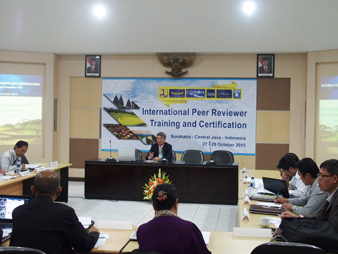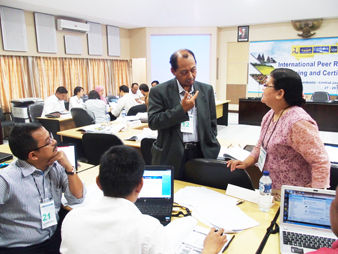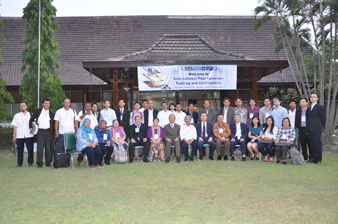NARBO
“International Peer Reviewer Training and Certification”
koichirou OMOTO
NARBO secretariat
![]()
(Background)
As it is widely known that River Basin Organization (RBO) is recognized crucially important because it is mainly expected to coordinate the interests of various stake holders such as water user, environment conservation, and flood management. To make this kind of organization more sustainable and strengthen, Network of Asian River Basin Organizations (NARBO) had provided the opportunity to raising awareness of importance of enhancement of RBO’s performance-we usually call it as “Performance Benchmarking Training” to its member organizations. This is the one of pillar event of NARBO activities and we had contributed to disseminate the concept in Nam Theun Nam Kading River Basin Committee (NT-NKD RBC) of Lao PDR, Selangor Water Management Authority (SWMA) of Malaysia, Help Davao Network (HDN) of the Philippines, and Mun River Basin Committee (Mun RBC) of Thailand. In addition, as this concept had been recently developed and been spread by Center for River Basin Organization and Management (CRBOM), Indonesia. They have promoted and thrust it to other RBO in Indonesia through holding domestic seminar.
To make RBO’s performance sustainable and strengthen continuously, it seems to be necessary to have an opportunity to increase the number of Peer Reviewer as much as possible.
(Outline of the training)
This time, ADBI and CRBOM planned to co-hold the “International Peer Reviewer Training and Certification” by Performance Benchmarking Training with aiming at ⅰ;Sharing knowledge about implementing River Basin Organization (RBO) Performance Benchmarking, ⅱ;Improving awareness and benefits of RBO Performance Benchmarking in implementing IWRM and ⅲ ;Increasing the number of Peer Reviewer of RBO Performance Benchmarking with international standards.
16 participants from 7 countries (Cambodia, Lao PDR, Malaysia, Myanmar, the Philippines, Thailand and Viet Nam) and approximately 10 participants from Indonesia gathered. As this training was executed in the form of group work, participants are formulated into 3 gropes each;
Group1; Mission and Learning and Growth,
Group2; Stakeholders,
Group3; Internal Business Processes and Finance
Background of each participant was various: some participants have now been engaged in establishing RBO as ongoing project in their own country, but others haven’t much experienced. Nevertheless, participants asked questions to lecturers and their colleagues each ardently in the lecture and desperately tackled with each work.
On 27 Octber, Instructors explained basic knowledge of RBO Performance Benchmarking.
Before noon, Dr. Keizrul, Bin Abdullah, chairperson of NARBO kindly delivered the opening remarks on the topic of NARBO and Peer Reviewing. He explained the original meaning of “Peer Review” and the importance of this training course. Dr. Takeyoshi Sadahiro, senior IWRM specialist of JWA introduced the program and overviewed the feature of RBO Performance Benchmarking. Mr. Tadashige Kawasaki, IWRM specialist of JWA explained the Performance Benchmarking Indicator and reported on the conference of OECD Water Governance Initiative.
After the luncheon, explanations of the following topics were given. Self Assessment (SA) Process and Analysis of it were introduced in detail by Professor Rohadi Masyhadi from Indonesia. Following this lecture, method of interview to SA members was explained by Mr. Cesar Quintos, Performance Benchmarking specialist from the Philippines. He showed its procedure simply and specifically by touching upon his experience in his organization. Lastly, “expected outputs of Peer Review Report” was lectured by Mr. Tjoek Walujo Subijianto, senior advisor of NARBO. He pointed out importance of “recommendation” to its evaluation to make this process smoother.
All participants were organized into 3groups as above and assigned tasks from the training committee.
On 28 October, participants were engaged in group study. Main topic of this day was analyzing SA Report of Bengawan Solo River Basin. Each group was assigned the area of the indicator to be evaluated and practiced the role of peer reviewing in the form of discussing and prepared ardently for next day's presentation. In their discussion, there were some differences between foreign interviewer and Indonesian interviewee over the rating of key performance area. This shows there is the recognition gap on how water should be treated by RBO not only between interviewer and interviewee but Indonesian and other participant.
29 October is the final day of this training. This day’s presentations on reviewing the report by these groups were based on the lectures and discussion in each group. As all the participants are announced that preparation was important if the reviewer evaluate the items of self assessment team, each group carefully assessed it with their reasons. And further discussion was held to remove recognition gap between each groups. After completing the additional meeting, final evaluation was shown with some key fact and recommendation in plenary meeting through wrap up meeting.
A foreign participant who played as a chair in a group of peer reviewer was awarded because she gave a excellent presentation.
Most of participants are satisfied with this training in general, and I suppose this event was of valuable for them from the following viewpoint in addition to original objectives;
1. Promoting disseminating regional experiences among member organization
2. Raising awareness of necessity of continuous organizational improvement of RBO
3. Something clue on management or improvement of RBO performance for each participants.
Furthermore, I think it seems to be more important from now that how each participant shares the knowledge what they acquired in the training with their colleagues and how they recognize peer review process will make the situation surrounding RBO improve through deepening mutual cooperating between different sectors namely government and private.
 |
 |
 |